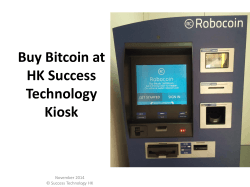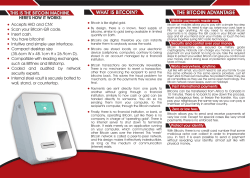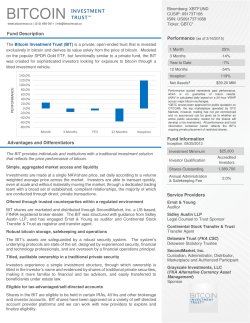
Security tips: - Bitcoin Embassy
How to import bitcoins from a paper wallet The Bitcoin Embassy recommends that you inform yourself about the technical aspects of your wallet before storing funds and urges you to remember that: 1. You are responsible for the security of your funds 2. You should not reveal your private key to anybody unless you trust them fully. What is a Bitcoin wallet and what does it do? A Bitcoin wallet is a software which manages your Bitcoin addresses and private keys and with which you can store and spend your bitcoins. The Bitcoin address, to which is associated your Bitcoin balance, is your identity on the Bitcoin network. The private key allows you to spend Bitcoins from that address. They can both be represented either as a string of letters and numbers or a QR code. A “paper wallet” refers to any physical object on which you can find a matching pair of Bitcoin address and private key, usually a piece of paper. To use the bitcoins of your paper wallet, you must transfer them to another wallet by importing the private key. You only need to go through this process once and, apart from making back-ups to secure your funds, you won’t need to use your private key on a day-to-day basis Remember: being the owner of bitcoins means being in possession of their associated private key or seed. You should always make a back-up of your wallet's seed in case you lose access to your Bitcoin wallet (e.g. lost password, lost phone). You can do so by simply writing it down on a piece of paper. A seed normally consists of a string of randomly generated words Security tips: Avoid carrying around your public and private keys together on a paper wallet. It’s like writing your PIN on the back of your credit/debit card. Never store your bitcoins on a paper wallet you have not yourself created. The creator can keep a database of all the private keys he printed. The paper wallet with which you acquire new bitcoins is meant to be temporary How to get a Bitcoin wallet? 1. Mobile wallet - An application on your smart phone or tablet (available on app stores) Examples: Mycelium (Androind) and Breadwallet (iOS) 2. Desktop wallet - A software on your computer Examples: Electrum 3. Web wallet - A simple web page on an internet browser Examples: Coinkite All these wallets have an "import private key" feature. To import bitcoins from your paper wallet, you simply need to scan the QR code of the private key on your paper wallet or manually enter the private key. For more information, advice and wallet details go to www.bitcoin.org/en/choose-your-wallet For in-person technical assistance, contact us at info@bitcoinembassy.ca or visit us at 3489 Saint-Laurent
© Copyright 2025
















